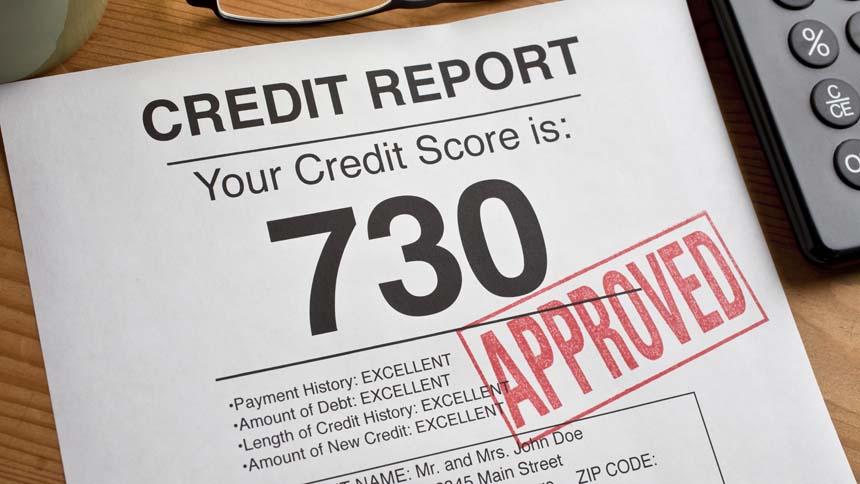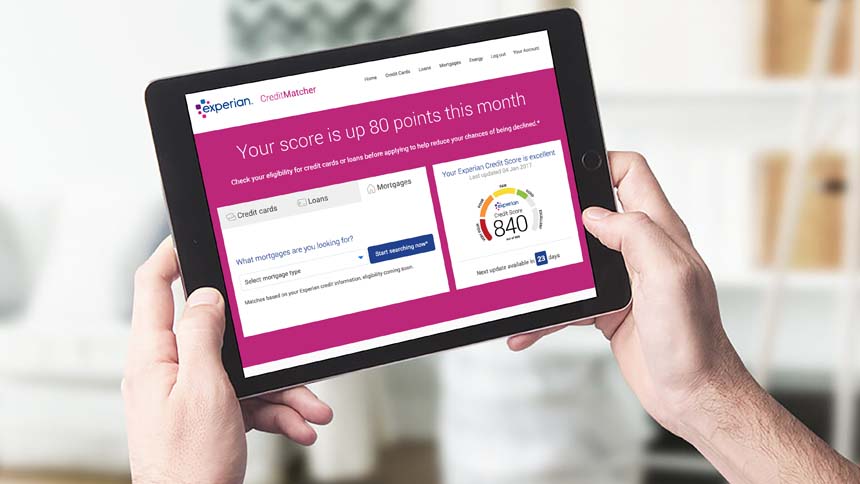A lender will check your credit report and credit score with credit reference agencies to help them decide whether to lend you money for a mortgage.
A bad credit score can reduce your mortgage borrowing options. County Court Judgments (CCJs), defaulted payments and bankruptcy orders lower your credit score and make it harder to get a mortgage.
Let's start with the beginning, if you are not sure what a credit score is, head that way.
How does your credit score help you get a mortgage?
 A mortgage is the most important financial product most people will ever have and one of the most difficult to obtain.
A mortgage is the most important financial product most people will ever have and one of the most difficult to obtain.
Lenders will check your credit score and this will, along with other factors, help them decide whether and how much to lend you. Lenders can reject credit applications based on your credit score.
Joe Green, consumer affaits specialist at Experian said: "When you make a credit application, the lender you apply to will look at three sources of information to help ‘score’ your application. They will consider information from your application such as your income and employment status together with any customer records they have with you already.
"They will then seek your permission to review your credit report to see how you have repaid any credit lent to you in the past. All of this information is combined together with their lending policy rules to give your application a score. It is this score that will help the lender decide whether or not to accept your application."
The main influence on the interest rate you can get on a mortgage is the loan-to-value (LTV) ratio, the percentage you want to borrow of the value of the property. However, your credit score can also influence the rate you can get.
CRA’s compile credit histories from a variety of different sources that indicate how effectively your past debts have been managed and paid including credit card and loan companies, utility companies, store cards, the electoral role and CCJs.
Each time you open a form of credit, it will leave an electronic mark on your credit report. This is for lenders to see and use to assess your credit application and decide if they want to lend you money or not.
How to fix an error
If someone has fraudulently applied for credit on your behalf or there is a mistake, for instance a debt that is marked as still outstanding that you know you have paid, then you need to fix it.
To do this, contact the CRA. They have 28 days to remove the information or tell you why they won’t. During that period, the entry will be marked as ‘disputed information’, and lenders can’t use it as part of the assessment criteria.
You can also contact the lender directly who has given the CRA the information. They have provided the CRA with the information and may be best placed to help.
Credit scores and joint mortgage applications
 If you're applying for a joint mortgage, both individuals credit scores will be assessed, so if one of you has a poor rating you can take action in the months leading up to your application to improve a poor credit score.
If you're applying for a joint mortgage, both individuals credit scores will be assessed, so if one of you has a poor rating you can take action in the months leading up to your application to improve a poor credit score.
Firstly, it is important to actually check your credit score. You can do this for free through Experian.
Check to see if there are any errors or negative marks on it relating to ex-partners or housemates you used to live with and get them removed.
You can also ensure that older products such as an old credit card account that you thought was cancelled are not still on your credit report. If they are these will be included in the available credit you currently have and may influence future credit applications and your overall credit score.
Financial black marks associated with ex-partners or people you shared an address with can harm your credit score. In extreme cases you can apply for a ‘notice of disassociation’ which is a request to the CRA’s that you and another person are no longer formally financially linked. This will remove their influence on your credit score.
There are a variety of ways to help improve your partners’ credit score which will benefit them individually and both of you as a couple.
You could transfer an outstanding credit card balance from whichever partner has the poorest credit score to the one with the stronger score. Currently there are deals where you can get 0% interest for up to 43 months (usually a 2-3% fee is payable on the balance being transferred). This will improve your partners score and also gives a couple time to pay off the debt before interest is charged.
If one of you has not registered on the electoral roll at your current joint address, do so as this creates a financial association between you both helping the person with the lower score to get some benefit from being associated with someone with a stronger credit score.
What if you have a poor credit rating?
The most important action to take is to make sure going forward that you make all payments to creditors on time. If you have to miss a payment, communicate with the lender, keep them informed and make the payment the following month to avoid lowering your credit score further.
CRA’s allow people to explain in 200 words why they have had a period of not managing credit well. So, if you were made redundant and this period continued until you found a new job, then through a ‘notice of correction’ you can explain why you missed payments and how your financial situation has now improved.
Building a credit history
If you don’t have much of a credit history and want to build one to help your chances of being accepted for a mortgage, then take out a store card or credit card, use them and pay of the balance each month without fail. Open a few accounts and prove you can manage the credit as this will speed up the process of improving your credit score. Whatever you do, don’t miss any payments as this will make your situation worse.
Joe Green said: "In order to strengthen your credit score, look for easy opportunities to build up your track record. Simply running a bank account and a mobile phone contract all contribute credit history information to your credit report.
"You may want to consider getting and using a credit card for small, regular purchases. Many regular household bills such as gas, electricity and water are now registered on credit reports too, giving people more opportunities to build a good score."
How to improve your credit score to get a mortgage
 The first point to make is that you have to borrow to actually get a good credit score. Never applying for or using credit means you don’t have the chance to build up a credit score because there is no evidence to show you can manage credit well.
The first point to make is that you have to borrow to actually get a good credit score. Never applying for or using credit means you don’t have the chance to build up a credit score because there is no evidence to show you can manage credit well.
If you have not used many forms of credit then you could look to access low levels of credit that you can then show you can manage effectively. This will improve your credit score.
Experian's Joe Green explains: "Mortgage affordability rules mean lenders are required to ensure you can afford repayments in the future - if for example the interest rates rise – so it’s good to pay debts down in the run up to a mortgage application.
"If you are thinking of applying for a mortgage, spending some time understanding what lenders will be looking for and how you can improve the picture your credit report paints of your financial situation can really pay dividends."
Experian tips on improving your credit score to help get a mortgage
- Use some credit, make repayments on time, stick to any borrowing limits and try to keep balances low, ideally less than 50% of the credit limit on any credit cards. Avoid maxing out your credit cards regularly as it may imply you need credit to survive.
- Register on the electoral roll to help lenders confirm that you are who you say you are.
- Avoid applying for other credit in the run up to a mortgage application and, generally speaking, space out your credit applications to avoid looking desperate.
- If you've linked your credit report to someone else's by taking out joint credit and then the relationship ends, tell all three credit reference agencies so they can update your credit report.
If your credit score is low and you are planning on applying for a mortgage in the next year then you should stop applying for other forms of credit until you have sorted out any other problems contained in your credit report and improved your credit score.
Also, only apply for credit you are likely to get and ask lenders to just do a ‘quotation search’ initially as this gives a guide as to whether you are likely to be accepted for it and a probable rate that you will be offered without leaving a mark on your credit report. Cancel any unused credit cards to reduce the total amount of credit you have available.
Being on the electoral register is vital as this is what lenders use to check who you are you say you are. Make sure all of your debts are linked to your current address and correct legal name.
What are lenders looking for?
- Lenders don’t want to see many different forms of credit. If you use each credit source to the max, lenders will see this as a negative as it suggests you are financially stretched.
- Don't have credit you never use as lenders assess using the total amount of credit you have access too, not just how much you actually use.
- Space out applications because if a lender sees you have made lots in a short space of time, they may conclude that you are desperate.
- Lenders also prefer to see a fixed land line on an application form rather than a mobile as this shows you have a permanent roof over your head.
- Long-term employment history and ideally living in one place for a good length of time will also be looked upon favourably by lenders.
The strategy lenders like most is if you have access to a reasonable amount of credit from a handful of sources that you use but don’t push to the limit and which also provide evidence that you can manage credit and make repayments.
What factors influence your credit score in a negative way?
- High levels of existing debt influence your credit score in a negative way. Banks and building societies may be reluctant to lend you further money if they think you are overstretched.
- A county court judgment (CCJ) for an unpaid debt or missed payments on a mortgage, personal loan or even a utility bill will lower your credit score and stay on your file for six years.
- Don't apply for too much credit at once. Each application shows on your credit report so if you're turned down find out why and try and improve your credit score before applying again.
- Many products allow you to apply through a ‘soft application,’ which shows if you are likely to be accepted and doesn't stay on your credit report and so won’t have a negative impact on your credit score.